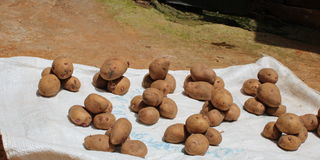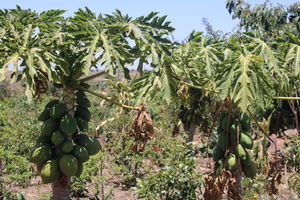Potato industry poised for revival as farmers adopt climate-friendly technologies

A potato farm in Nyandarua County on April 2, 2025.
What you need to know:
- The Food and Agriculture Organization ranks Kenya number 33 in potato production out of 155 potato-growing countries, but the country has recorded a steady over the years.
Hit by the realities of climate change, potato farmers are in a race to adopt climate-friendly technologies, drought-tolerant varieties and certified seed multiplication methods to boost production.
Experts believe these innovations will fully commercialise potato farming, reducing reliance on imports and reversing the decline in local production.

Irish potato on sale by the roadside in Ndaragua, Nyandarua on April 2, 2025
Mr Wachira Kaguongo, the National Potato Council of Kenya’s Chief Executive Officer, highlighted the severe impact of climate change on both seed and tuber production. “Due to erratic rainfall, seed production hasn’t kept pace with the growing number of seed producers. To counter this, we are partnering with farmers who have irrigation systems and technologies, particularly those using green energy like solar power. This is in addition to promoting fast-maturing, drought-resistant varieties such as Shangi, Asante, and Unica,” he said.
Mr Wachira also attributed some opportunistic diseases and pests to climate change.
Seed multiplication
He added that other technologies such as apical cuttings technology are already in use in Nyandarua County. “This method enables seed multiplication during dry spells, ensuring availability for planting once rains return,” he said.
Nyandarua County, a member of NPCK and a major potato producer that contributes 35 per cent of Kenya’s potatoes, is at the forefront of adopting these innovations. The county’s Agriculture Executive Francis Miring’u noted that the interventions are working for the local farmers.
“Potato is Nyandarua’s main cash crop. Driven by the demand for certified seeds, many investors have shown interest in the venture, but a number of them get frustrated, abandoning the venture along the way due to unpredictable weather,” he said.
He added that the county’s Ol Joro Orok Agricultural Training College serves as a key seed multiplication centre. Nyandarua Governor Kiarie Badilisha said the county’s efforts to embrace climate smart farming have attracted stakeholders focused on food security.
Among the stakeholders working with the county are the Alliance for Green Revolution and the International Fertilizer Development Center.
“We have successfully revived the giant Nyandarua Farmers Cooperative Union to champion farmers’ interests. With time, we have learnt that there are many unexploited opportunities in the potato industry, including climate-related opportunities,” said the governor.
Another critical player is the World Bank under the National Agriculture Value Chain Development, where 25 cooperative societies and 25 saccos in Nyandarua involved in climate change and value addition projects are benefiting from Sh350 million grants. Similar support extends to other value chains, including dairy, poultry, and pyrethrum.
The Food and Agriculture Organization ranks Kenya number 33 in potato production out of 155 potato-growing countries, but the country has recorded a steady decline over the years. For example, in 2022, Kenya produced 1,745,000 tonnes of potatoes against a worldwide production of 374,777,763. Despite the global potato production rising by 0.3 per cent in 2022, Kenya’s output dropped from 2.1 million metric tonnes in 2021 to 1.7 million in 2022. China leads global production (25 per cent), while in Africa, Algeria topped the list with a production of 4,299,817 tonnes. Belgium followed at 3,577,730 tonnes, while South Africa was third at 2,528,946.
Kenya admits there are huge gaps and unexploited opportunities in potato production. Experts identify limited access to clean seeds, climate change, and sluggishness in embracing modern farming technologies among the main challenges.
Although licensed seed producers have increased from four to 28, annual production remains insufficient, creating a 20,000-metric-tonne deficit against a 30,000-tonne demand.
Mr Wachira said that with aggressive farmer training on the importance of certified seeds, the demand for clean planting materials has drastically increased.
He added that various interventions, including Soko Digital Platforms for seed use and other channels such as common interest farmer groups, model farmer adaptation, and increased extension officers posted in counties have improved seed access and market linkages.
“The council has partnered with processors and market outlets to buy potatoes from contracted farmers. Under the contract farming model, the farmers grow a specific variety guided by the buyer and processors’ tastes and growing specifications.
“Due to high demand for the seeds, we are partnering with more multipliers. We currently have registered seed producers who own certain varieties. Some do not have enough land for propagation, and we are thus connecting them with new propagators with huge tracks of land to help them multiply seeds. That way, we will have boosted foundation seed production,” said Mr Wachira.
He added that they are also helping new propagators register with the Kenya Plant Health Inspectorate Service (KEPHIS) for certification.
KEPHIS partners with propagators, supporting their seed production and certification. The National Potato Council of Kenya purchases the seeds for resale to farmers. “Currently, we are refunding money to farmers who have overbooked the seeds. That is the gap we want to cover. The challenge is that the demand for clean seeds has increased. Large-scale farmers book in advance. This affects small-scale farmers’ access to the seeds, another gap we intend to cover through the ongoing initiatives,” said Mr Wachira.
Other players in the promotion of the potato industry are the Kenya Bureau of Standards and the Agricultural Food Authority, which are setting standards to enhance potato quality for export. This move aims to replace imported processed potatoes with locally produced ones, meeting demand from franchises like KFC.
NPCK is finalising the formation of a National Potato Growers Cooperative Society to streamline input access, production, and marketing, ensuring farmers get better returns.
With these interventions, Kenya’s potato industry is poised for a revival, leveraging climate-smart farming, certified seeds, and strong market systems to secure food security.





